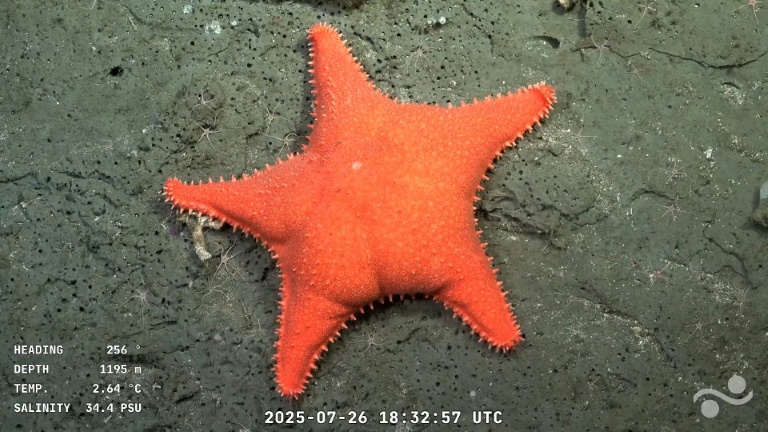World
Underwater Robot Live Stream Sparks Fascination Among Argentines

A team of scientists has captivated audiences in Argentina with a live stream of an underwater robot exploring the depths of the South Atlantic Ocean. The expedition, which utilizes the SuBastian robot, showcases vibrant coral and previously unseen marine life from the Mar del Plata canyon, plunging nearly 4,000 meters (13,000 feet) below the surface. Since its launch on August 1, 2024, the live stream has garnered over one million views daily, providing an unprecedented glimpse into marine biology.
The Argentine-American scientific mission is led by a group of 25 researchers, primarily from the Argentine research agency CONICET, and is supported by the Schmidt Ocean Institute. The expedition, titled “Underwater Oases of the Mar del Plata Canyon,” is set to conclude on August 10, 2024. As scientists remotely operate the robot from the research vessel Falkor (too), they collect biological samples and send back high-definition images to viewers, enhancing public engagement with science.
The live commentary has opened a dialogue between scientists and the audience, allowing for real-time reactions. In one memorable moment, the camera captured a peculiar white creature, leading to enthusiastic responses in the live chat, including “Do we want it?” followed by a chorus of “Yes, yes, we want it!” as the team prepared to collect the specimen. Comments like “I love these little creatures” and “Don’t take the little one away!” illustrate the fascination viewers have for marine life.
Marine Discoveries and Social Media Buzz
The expedition has revealed stunning underwater landscapes and bizarre marine species. Pablo Penchaszadeh, a marine biologist and painter on board, expressed amazement at the discovery of cold-water corals displaying colors typically associated with the Caribbean, despite being located at depths of 3,000 meters. The unique confluence of the cold, nutrient-rich Malvinas current and the warm, salty Brazil current fosters a diverse ecosystem, making it one of the most energetic regions in the ocean.
This week, social media exploded with excitement following the appearance of an orange starfish resembling the character Patrick Star from the animated series SpongeBob SquarePants. Memes circulated, humorously suggesting that “Patrick is Argentine.” Another creature, a king crab, was dubbed “Drag Queen,” while a sea cucumber earned the nickname “Sweet Potato.” Such interactions underscore the public’s engagement with marine biology, making it a trending topic on social platforms.
Challenges Facing Scientific Research in Argentina
Despite the enthusiasm surrounding the expedition, the scientific community in Argentina faces significant challenges. The government’s recent budget cuts have severely impacted CONICET, with funding decreased by 21 percent last year. Salaries for researchers have plummeted by 35 percent since President Javier Milei took office in December 2023, leading to an exodus of talent from the scientific field.
Biologist Tomas Atilio Luppi, affiliated with a marine research institute in Mar del Plata, noted the importance of public interest in science during these difficult times. “This is happening at a very complicated moment,” he remarked. “Science is in a very complicated position, both financially and in terms of support and human resources.” The excitement generated by the expedition serves as a “beacon of light” amid the challenges faced by researchers.
The live stream illustrates how technology can democratize science, allowing the public to connect with research in real time. Expedition leader Daniel Lauretta emphasized this point, stating, “Science is no longer something distant or inaccessible; it becomes part of everyday life.” As the mission continues, it not only enriches our understanding of marine ecosystems but also fosters a renewed appreciation for scientific exploration in Argentina.
-

 World3 months ago
World3 months agoScientists Unearth Ancient Antarctic Ice to Unlock Climate Secrets
-

 Entertainment3 months ago
Entertainment3 months agoTrump and McCormick to Announce $70 Billion Energy Investments
-

 Science3 months ago
Science3 months agoFour Astronauts Return to Earth After International Space Station Mission
-

 Lifestyle3 months ago
Lifestyle3 months agoTransLink Launches Food Truck Program to Boost Revenue in Vancouver
-

 Technology2 months ago
Technology2 months agoApple Notes Enhances Functionality with Markdown Support in macOS 26
-

 Top Stories1 week ago
Top Stories1 week agoUrgent Update: Fatal Crash on Highway 99 Claims Life of Pitt Meadows Man
-

 Sports3 months ago
Sports3 months agoSearch Underway for Missing Hunter Amid Hokkaido Bear Emergency
-

 Politics2 months ago
Politics2 months agoUkrainian Tennis Star Elina Svitolina Faces Death Threats Online
-

 Technology3 months ago
Technology3 months agoFrosthaven Launches Early Access on July 31, 2025
-

 Politics3 months ago
Politics3 months agoCarney Engages First Nations Leaders at Development Law Summit
-

 Entertainment3 months ago
Entertainment3 months agoCalgary Theatre Troupe Revives Magic at Winnipeg Fringe Festival
-

 Politics1 week ago
Politics1 week agoShutdown Reflects Democratic Struggles Amid Economic Concerns









